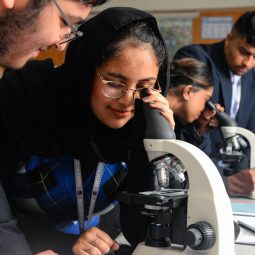Geography
Geography (OCR)
Where we come from, what we do, what we eat, how we move about and how we shape our future? These questions are all directly the province of the Geographer.
More than ever we need the Geographer’s skills and foresight to help us learn about our planet- how we use it and how we abuse it’ Michael Palin.
Climate change, earthquakes in Nepal and European migration crisis– these, amongst others, are all explored in Geography.
- Why do these things happen?
- Do people contribute to the causes?
These are just some of the questions answered in this relevant and exciting subject.
Fieldtrips are an integral part of geography and will offer you the chance to learn outside the classroom and experience our world and its current issues. A level Geography is a lively and thought-provoking subject well acknowledged among employers.
Course Content & Assessment
Paper 1: Physical systems
22% of A level, (1 hour 30, 66 marks)
This exam is split into 2 sections;
Section A
Examines landscape systems, where our focus is with coasts. This will be taught during Y12.
Section B
Earth’s life support systems is concentrated on investigating the carbon and the hydrological cycles, and how these two systems are linked.
In addition geographical skills will be assessed throughout. Questions are made up of short answers and extended response.
Paper 2: Human interactions
22% of A level (1hour 30, 66 marks)
Again this section is split into two sections,
Section A
Changing spaces, making places, which will be taught in Y12.
Section B
Global connections focusses on investigating global migration patterns and looking at the relationship between powers and borders.
In addition geographical skills will be assessment throughout. Questions are made up of short answers and extended response.
Paper 3: Geographical debates
36% of A Level (2 hours 30, 108 marks)
This paper will examine 2 contemporary themes, Disease Dilemmas and Hazardous Earth.
- Disease Dilemmas will be studied in Y12.
- Hazardous earth concentrates on investigating volcanoes and earthquakes.
There are 3 sections to this examination:
Section A focusses on your knowledge and understanding of the themes studies. Questions are made up of short answers and extended response.
Section B is again synoptic style questions made up of short answers and extended response.
Section 3 requires you to write 2 essays.
Independent investigation (Non-examination assessment): Investigative geography 20% of A level (60 marks)
Investigative geography gives you the opportunity to undertake an independent investigation which is of particular interest to you.
It can be related to any area of the specification.
Staff will take a supportive coaching role to guide you through this process.
It should be around 3-4000 words in length.
To support you in this the department have planned numerous fieldwork opportunities including a 2 night stay at Cranedale FSC in N Yorkshire, to collect the necessary data and to meet the course requirements.
Teaching
Lessons will be taught by experts in each discipline, based in specialist classrooms.
Teachers ensure that your learning is enhanced by employing a wide range of teaching and learning activities using a variety of resources. Some sessions are led by students following your own research.
The department uses a range of new technologies to enhance learning experience especially to compliment the skills unit. Substantial guidance and support is also provided by teaching staff in guiding students through the independent investigation
Your Future
Statistics show that compared to other subjects Geography graduates are among the most employable. This is presumably because they possess the skills that employers look for. In part this is because the subject is a combination of the facts of science and the understanding of the arts.
Geography graduates were surveyed after their degree courses about their career destinations.
The results show: (source AGCAS):
- 40.6% management and administration
- 24.8% further training including PGCE for teaching
- 11.4% financial sector
- 10.4% retail
- 10% other professional including media and law.
The Blue Coat Sixth Form is proud to be part of the Cranmer Education Trust
Cranmer Education Trust is a company limited by guarantee and an exempt charity registered in England. Company registration number: 07687709. Registered Office: Cranmer Education Trust, c/o The Blue Coat School, Egerton Street, Oldham OL1 3SQ. The website address is www.cranmereducationtrust.com and the phone number 0161 785 5082.









